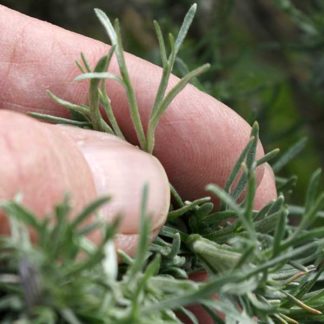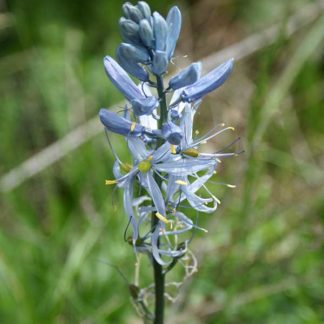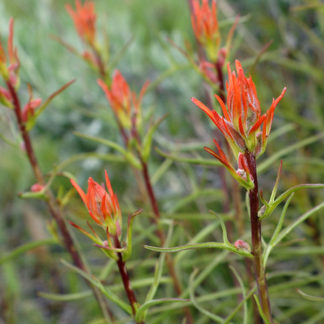spike
Showing 1–12 of 43 results
-

Aconitum columbianum / monkshood
- brilliant blue/purple - ish; mixed colors or white
- petal-like sepals form the hood
- palmate, deeply-lobed & toothed leaves
-

Agastache urticifolia / western horsemint
- short or tall flower heads ranging from pale to deep purple
- square stems, opposite leaves
- minty aroma
- common along trails, especially in sun
-

Agropyron cristatum / crested wheatgrass
- cool season grass growing in dense tufts
- easily recognized by planar spike
- spikelets overlap and are angled with respect to the stem
- common
-

Amaranthus retroflexus / pigweed
- green bottle-brush inflorescence
- accomplished weed on disturbed sites (including road & driveway cracks)
- often in gardens, farm fields (edges), roadsides
-

Artemisia cana / silver sagebrush
- Low perennial, silvery shrub
- Highly aromatic, like sagebrush
- Entire leaves - no lobes
- Nondescript, inconspicuous flowers in small clusters with leaf-like bracts
- Grows in more moist habitat than other Artemisia spp.
-

Artemisia rigida / stiff sagebrush
- low growing deciduous shrub
- short, 3-5 lobed, grey leaves (hairy)
- mild to pungently aromatic leaves
- brittle branches up to 16 inches long
-

Artemisia tripartita / threetip sagebrush
- evergreen shrub; branches in broom-like clusters
- all parts covered with silvery/grey-green glandular hairs
- leaves long and very deeply, very distinctly 3-lobed
- flowers in spikes/racemes - all bits teeny, overall yellow-ish/reddish
- often with mountain big sagebrush on nutrient poor soils
-

Bassia scoparia / burningbush
- large, annual herb (forb)
- leaves long-ish and narrow
- inflorescence a highly branched spike with teeny green/yellow flowers
- may form huge, invasive colonies
- whole plant turns red in fall
- a tumbleweed
- especially in disturbed areas and wastelands in the Valley
-

Camassia quamash / small camas
- immediately visible for its star-shaped blue flowers and yellow anthers
- flowers borne on a spike-like raceme, opening from the bottom up
- multiple flowers open at one time
- leaves are grass-like, growing from a bulb
- large seed capsules with ca. 30 roundish black seeds, ripe in late summer
-

Castilleja linariifolia / Wyoming Indian paintbrush
- generally taller than most paintbrushes (up to 3 feet)
- very thin leaves, seldom lobed, seldom hairy
- red inflorescence bracts, may be lobed
- flowers extend well beyond bracts
- calyx is red and shorter than the corolla which is greenish yellow
- rocky areas with sagebrush and conifer forests
-

Castilleja spp. / paintbrushes
- vibrant, red (or yellow) inflorescence (bracts)
- widespread, but confusing... five or more species in the area
-

Castilleja spp. / two yellow paintbrushes
- look like Indian paintbrushes (which they are), but yellow
- inflorescence bracts possibly lobed
- height ranges from less than 8" to about 15"
- subalpine, alpine and tundra habitats, in clumps or spread out
- linear leaves without lobes, 3 prominent veins
- red to maroon, hairy stems
Showing 1–12 of 43 results